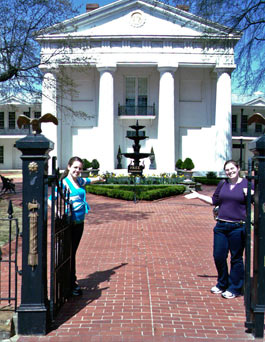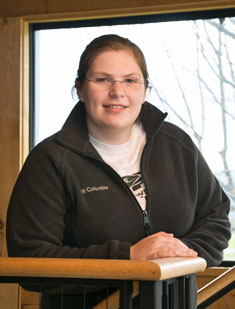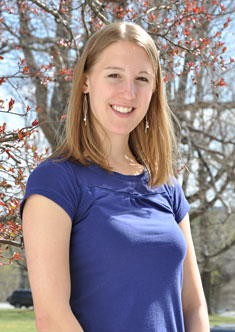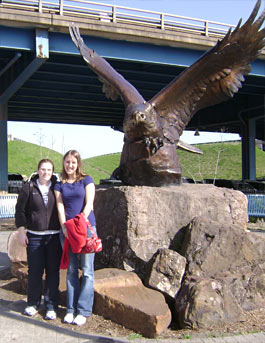
Colby-Sawyer College Students Present Papers at 2010 Alpha Chi Honor Society's Super-Regional Convention
Three Colby-Sawyer College honors students presented research papers recently at the Alpha Chi National College Honor Society's Super-Regional Convention, with one winning an award in her region.
Seniors Rachael Smith and Amy Hebert and junior Jennifer Creasey attended the convention from March 25 to 28 in Little Rock, Ark. The students are New Hampshire residents and Wesson Honors Program Scholars, as well as members of Alpha Chi, the national honor society for top-ranked students.
The students presented their research papers, and then answered from audiences of 20 to 30 people. Professor of Social Sciences and Education Randy Hanson, who serves as faculty advisor to the college's Alpha Chi chapter, accompanied the students for the trip.
“Amy, Rachael and Jen did a wonderful job representing Colby-Sawyer and their majors,” says Professor Hanson. “Their presentations were excellent – well informed and well delivered.”
Smith, a nursing major from Milford, presented a paper entitled “Anthracycline Induced Cardiotoxicity: What Every Nurse Should Know.” She received one of two awards for Best Presentation in Region VI (New England and the mid-Atlantic states), along with a $100 check.
“I was nervous because I'm not a big fan of public speaking,” says Smith. “But I was surprised to find the judges enjoyed my presentation. We were graded on content, speaking and the ability to answer questions. There were some tricky questions, including one from a senior nursing major who asked something that research hasn't even answered yet.”
Hebert, an exercise and sport sciences major from Keene, presented a paper on“Faculty's Knowledge of and Attitudes Toward Student Participation in Athletics,” while Creasey, a junior child development major, discussed “Foster Care in the United States.”

Papers Born of Passions
During a recent clinical rotation in the oncology unit of Dartmouth-Hitchcock Medical Center, student nurse Rachel Smith learned that many of her patients with cancer had been treated with anthracylines, a class of chemotherapy agents used to treat different types of leukemias, lymphomas, breast cancer and other solid tumors. While the treatment saves many lives, it can also cause serious cardiac side effects.
“What interested me in the topic was that nurses outside of oncology do not know much about the side effects of this medication, but with increased cancer survivorship many nurses in different disciplines will work with patients who have been treated with anthracyclines,” says Smith. “I wanted to share this knowledge with other nurses so they are able to care for these patients. They need to be aware of the dangerous consequences of this life-saving medication.”
With encouragement from her clinical professor, Mary Scott, Smith researched the topic in more depth for a journal article and made it the focus of her Honors Capstone project. Additionally her article became the basis of her Alpha Chi convention presentation.
“Patients who have been treated with anthracyclines have a high risk of developing heart problems such as cardiomyopathy, arrhythmias, and congestive heart failure, problems that can occur from the onset of treatment to decades later,” says Smith. “It's important for nurses to know the signs and symptoms of heart problems caused by anthtracyclines, as well as the proper patient education and current treatment.”
Smith, who graduates in May, returned home to find a job offer from Dartmouth-Hitchcock Medical Center on the inpatient surgical floor, where she completed her externship last year and her preceptorship this semester.

Amy Hebert, a sport management in the exercise and sport sciences major, was interested in faculty perceptions of student-athletes at Division III colleges. She and her Capstone research group surveyed faculty and found that they have positive attitudes toward student participation in athletics and are knowledgeable about athletic policies and the resources available to student-athletes.
“We were excited with our findings that faculty were knowledgeable and possessed a positive attitude toward student participation in athletics,” says Hebert. “At a Division III college, which is made up of about one-third student-athletes, we hypothesized that faculty would have a positive attitude toward student participation in athletics, and our hypothesis was supported. While we had hypothesized that faculty would not be knowledgeable about resources available to student-athletes or athletic policies, we were excited to find that faculty were, in fact, knowledgeable about these areas.”
In her Alpha Chi paper, which will also serve as the culmination of her Capstone research, Hebert emphasized the importance of a positive campus climate for student-athletes as well as the need for compatibility and consistency between the academic and athletic arenas.
“I believe…consideration should be taken not only for student-athletes, but for any student with extracurricular responsibilities, be it as a club member, teacher, nurse or intern,” says Hebert. “Partaking in extra-curricular activities allows students to develop socially, academically, physically and intellectually.”
A personal interest in becoming a foster parent led child development major Jen Creasy to base her presentation on the topic of foster care in the United States. Through her research, which began in the context of a course called Services for Young Children, she hoped to learn how the system worked. “I found out that there are over 500,000 children in foster care in the United States, and that a good number of them won't ever be reunited with their biological parents and need to be adopted,” she says.
Creasy found, however, that most children in the foster care system are not adopted; instead, they “age-out” of the system and often find themselves on their own as young adults. “The reason I wanted to present this topic at the conference was to get the word out about foster care,” says Creasey. “The majority of people in the U.S. don't often think about foster care, and I was hoping to get just a few more to do just that. This is something that affects so many children and families, and that is exactly what we are supposed to be thinking of as child development majors.”

The City Outside the Conference
“The Alpha Chi convention was awesome,” says Hebert. “We presented and then we attended many other student presentations and professional presentations, including Carlotta Walls Lenier's talk on “A Mighty Long Way: My Journey to Justice at Little Rock Central High School.” (Leniers was the youngest of the Little Rock Nine, the African-American students who were integrated into the high school in 1957).
We also went to the Clinton Presidential Center and listened to three of Bill Clinton's political advisors (Carol Rasco, domestic policy advisor under President Clinton and now head of Reading is Fundamental; Janis F. Kearney, presidential diarist; and James L. “Skip” Rutherford, former advisor to Governor and President Clinton and now chairman of the board of the William J. Clinton Foundation).”
In their free time, the three students enjoyed spending time in the city, though Smith notes that Little Rock did not feel like a big city, with its residential areas within easy walking distance.
The Peabody Hotel, famous for its ducks in the lobby fountain, was a hit. “The Peabody was an amazing facility with beautiful amenities, rooms and phenomenal service,” says Hebert. “Everyone in Arkansas was so friendly.”
At Professor Hanson's urging to “eat the food of the land,” the quartet made a trip to Whole Hog to try some real barbecue.
“The barbecue was pretty good,” says Smith, “and overall we had a lot of fun. Randy told lots of stories about his travels and history; we had a good time.”
This was Alpha Chi's first-ever “super-regional” convention and was attended by more than 400 delegates. The aim of the program was to combine elements of a large national event with those of smaller meetings of the society's seven regions. The 2011 National Convention will be held March 31 to April 2 in San Diego, Calif.
For more on Alpha Chi's 2010 Super-Regional Convention, visit www.alphachihonor.org/index.cfm/conventions
-Kate Seamans and Kimberly Slover


